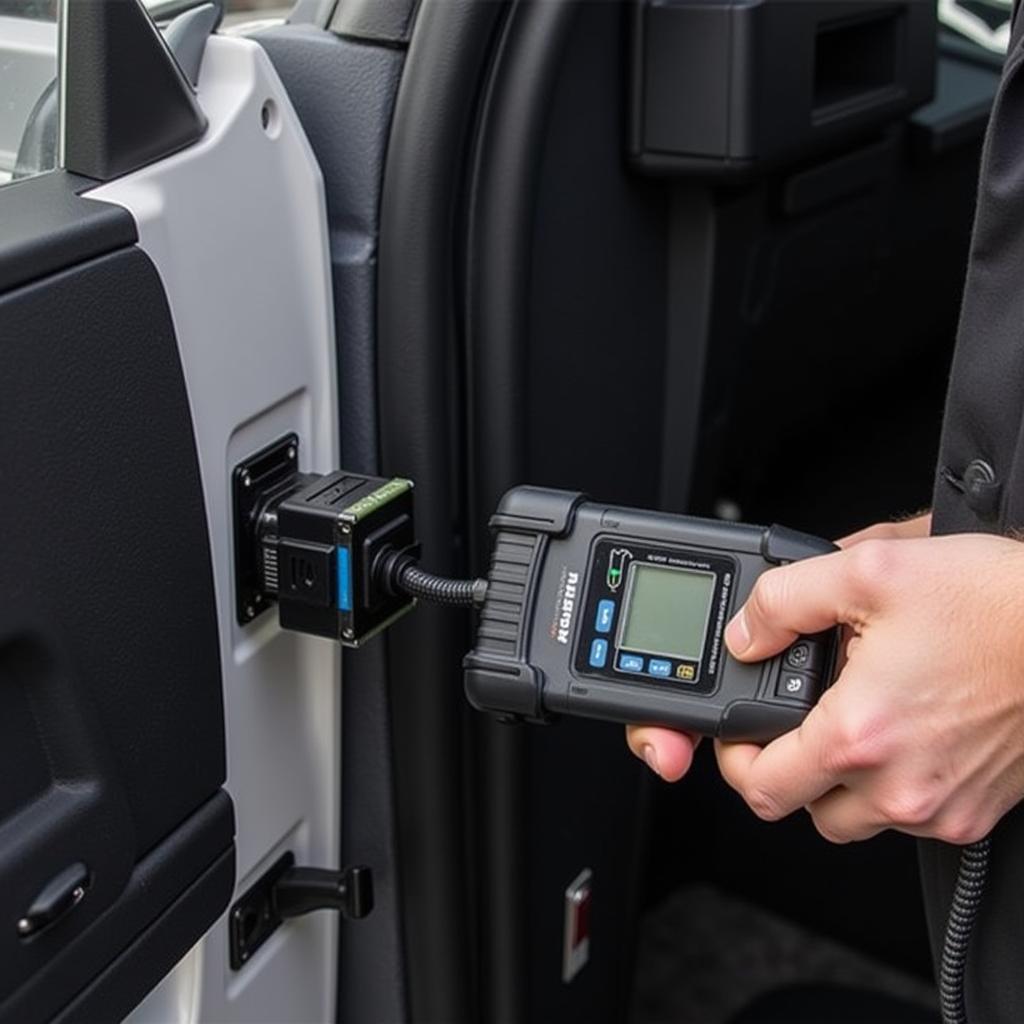Knowing the exact engine type code of your car is crucial for many reasons, from ordering the correct parts to troubleshooting performance issues. But what if you’ve lost this vital piece of information? Can vehicle diagnostics come to the rescue?
The answer, in short, is: it depends. While vehicle diagnostics can reveal a treasure trove of information about your car, including potential engine problems, directly accessing the engine type code isn’t always guaranteed. Let’s dive deeper into the intricacies of vehicle diagnostics and how they relate to finding your engine type code.
Understanding Vehicle Diagnostics and Engine Type Codes
Vehicle diagnostics, often performed with a device called an OBD-II scanner, tap into your car’s onboard computer system. This system continuously monitors various parameters and stores Diagnostic Trouble Codes (DTCs) when malfunctions occur.
On the other hand, your car engine type code is a specific alphanumeric identifier that details the engine’s make, displacement, fuel type, and other key characteristics. This code is vital for ensuring you use compatible parts and fluids for maintenance and repair.
 Vehicle Diagnostics with OBD-II Scanner
Vehicle Diagnostics with OBD-II Scanner
When Vehicle Diagnostics Can Help
While it’s not always a surefire method, vehicle diagnostics can sometimes indirectly lead you to your engine type code:
- Identifying Engine Control Module (ECM) Information: Your car’s ECM, a critical component of the engine management system, sometimes stores the engine type code within its data. Accessing this data through advanced diagnostic tools, often used by professional mechanics, might reveal the code.
- Decoding VIN (Vehicle Identification Number): Your VIN, usually found on the dashboard or doorjamb, contains valuable information about your car, including the engine type. While not directly accessible through basic OBD-II scanners, you can use online VIN decoders or consult your car manufacturer to decipher the engine code embedded within.
When You Might Need Alternative Methods
Unfortunately, vehicle diagnostics aren’t always the silver bullet solution for finding your engine type code. Here’s why:
- Limited Data Accessibility: Basic OBD-II scanners, commonly available to car owners, are primarily designed to read and clear DTCs related to emissions and engine performance. They may not have the capability to access the specific data containing your engine type code.
- Manufacturer Variations: The way manufacturers store and make accessible engine-related data within their systems can vary significantly. Some manufacturers might include the engine type code in readily accessible data streams, while others might require specialized tools or software to retrieve it.
 Mechanic Analyzing Diagnostic Software for Engine Information
Mechanic Analyzing Diagnostic Software for Engine Information
“It’s like trying to find a specific document in a vast library,” says automotive expert John Miller. “While vehicle diagnostics provide the search engine, finding the exact engine type code might require knowing precisely where to look and having the right tools to access it.”
Exploring Other Avenues
Don’t fret if vehicle diagnostics don’t lead you directly to the engine type code. Several reliable alternatives exist:
- Vehicle Documentation: Your car’s owner’s manual or service booklet often lists the engine type code.
- Manufacturer’s Website: Many car manufacturers offer online portals where you can enter your VIN and retrieve detailed vehicle specifications, including the engine type code.
- Dealership Assistance: Your local dealership can access their database using your VIN to provide you with the correct engine type code.
Conclusion
While vehicle diagnostics remain an invaluable tool for understanding your car’s health, they might not always provide a direct path to your engine type code. However, the wealth of information they offer, combined with alternative methods like consulting vehicle documentation, manufacturer resources, or seeking professional assistance, ensures you can effectively track down this vital identifier.
Remember, knowing your engine type code empowers you to make informed decisions regarding maintenance, repairs, and parts replacement, ultimately keeping your vehicle running smoothly for years to come.
FAQs
1. Can I find my engine type code with any OBD-II scanner?
Not necessarily. Basic OBD-II scanners primarily focus on reading and clearing trouble codes related to emissions and engine performance. Finding the engine type code often requires more advanced diagnostic tools and software typically used by professional mechanics.
2. Is my engine type code the same as my VIN?
No, they are distinct identifiers. Your VIN provides a broader identification of your vehicle, while the engine type code focuses specifically on the engine’s specifications. However, your VIN contains information that can be decoded to reveal your engine type code.
3. Why is it important to know my engine type code?
Knowing your engine type code is crucial for ordering the correct parts, ensuring compatibility with fluids and lubricants, and even understanding your vehicle’s performance characteristics.
4. Can I drive my car if I don’t know the engine type code?
Yes, not knowing your engine type code won’t prevent you from driving your car. However, it’s essential to have this information readily available for any maintenance, repairs, or part replacements to ensure you get the correct components for your specific engine.
5. What should I do if I’ve tried all the methods and still can’t find my engine type code?
If you’ve exhausted all other options, contacting your car manufacturer directly or visiting a certified dealership is recommended. They have access to comprehensive vehicle databases and can assist you in obtaining the correct engine type code for your car.
Need further assistance in locating your car’s diagnostic number? Check out our comprehensive guide: where to find car diagnostic number on car.
For personalized support and expert advice on all things car diagnostics, don’t hesitate to contact us via WhatsApp at +1(641)206-8880 or email us at [email protected]. Our dedicated team is available 24/7 to assist you.

Leave a Reply